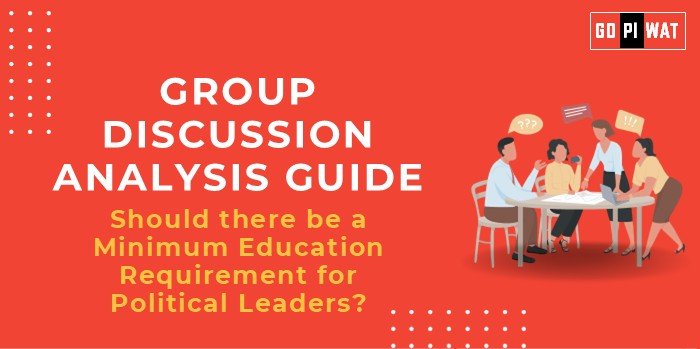📋 Group Discussion (GD) Analysis Guide: Should There Be a Minimum Education Requirement for Political Leaders?
🌐 Introduction
Opening Context: Across the world, the debate on whether education shapes better leaders persists. In India, where leadership often reflects diverse backgrounds, this topic becomes especially relevant.
Topic Background: The Haryana Panchayati Raj (Amendment) Act, 2015, introduced a landmark reform by mandating educational qualifications for candidates in local governance. This law was upheld by the Supreme Court, sparking national conversations on whether similar measures should apply to political leaders at all levels.
📊 Quick Facts & Key Statistics
- Global Literacy Rate: 86.3% (UNESCO, 2022); male literacy at 90%, female literacy at 82.7%.
- India’s Literacy Rate: 76% (Census, 2022); male literacy at 82.4%, female literacy at 65.8%.
- Haryana Panchayat Law: The 2015 amendment mandated Class 10 education for general candidates and Class 8 for women and Dalits, upheld by the Supreme Court.
- Gender Impact: Increased educational attainment in women correlates with higher political participation and confidence (UN Women Study, 2022).
📌 Stakeholders and Their Roles
- Government and Legislators: Formulating policies on education and representation.
- Political Parties: Assessing the inclusivity of their candidate pool.
- Educational Institutions: Providing platforms for political training.
- Civil Society: Advocating for or against reforms.
✨ Achievements and Challenges
🏆 Achievements
- Better Governance: Studies link higher education levels to effective policy-making.
- Haryana’s Example: Notable improvement in administrative efficiency after implementing education mandates.
- Women’s Empowerment: Educational reforms encourage greater female political participation.
⚠️ Challenges
- Exclusion Risks: The Haryana law excluded 40% of candidates, particularly women and marginalized groups.
- Urban-Rural Divide: Rural regions face barriers to access education, limiting candidacy options.
🌍 Global Comparisons:
- Estonia: Focus on governance training without formal mandates.
- United States: Informal emphasis on educational competence among leaders.
📋 Effective Discussion Approaches
- Opening Approaches:
- “Can education alone define a good leader? India’s literacy gaps and Haryana’s experiment provide nuanced perspectives.”
- “While education may enhance governance, is it fair to exclude those without formal schooling in a democracy?”
- Counter-Argument Handling:
- Emphasize grassroots success stories where leaders excel without formal education.
- Propose alternatives like mandatory leadership training instead of formal qualifications.
🔍 Strategic Analysis of Strengths & Weaknesses
- Strengths: Improves policy-making and administrative efficiency.
- Weaknesses: Risk of alienating underprivileged communities.
- Opportunities: Education can foster more informed decision-making.
- Threats: Over-reliance on formal education could ignore grassroots knowledge.
📖 Structured Arguments for Discussion
- Supporting Stance: “Education equips leaders with analytical tools for governance, proven by Haryana’s administrative outcomes.”
- Opposing Stance: “Leadership stems from community experience, not academic credentials, as shown by grassroots leaders.”
- Balanced Perspective: “A blend of academic knowledge and community insight fosters holistic leadership.”
📚 Connecting with B-School Applications
- Real-World Applications: Leadership requirements as case studies in governance and management.
- Sample Questions:
- “Should education outweigh representation in political leadership?”
- “How can we address education barriers while ensuring effective governance?”
- Insights for Students:
- Use Haryana’s case for projects on inclusivity in leadership.
- Explore governance training models as alternatives to formal education mandates.


